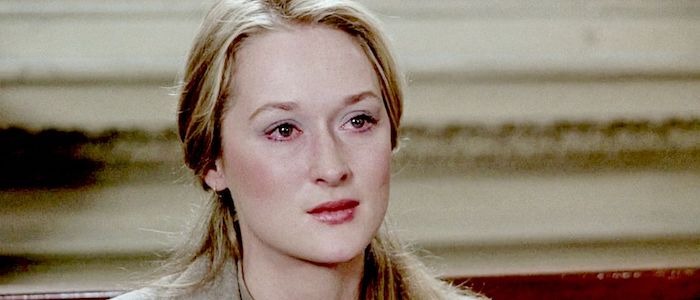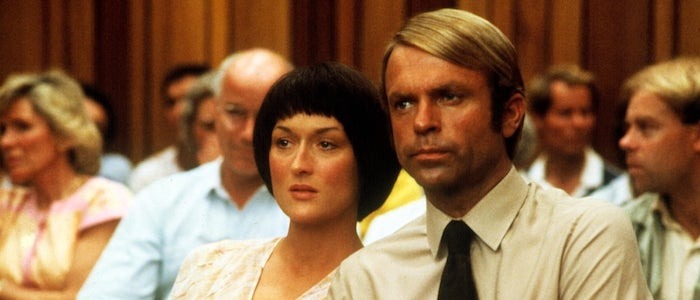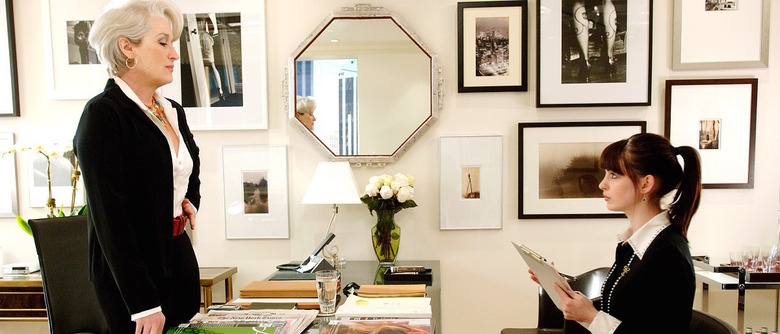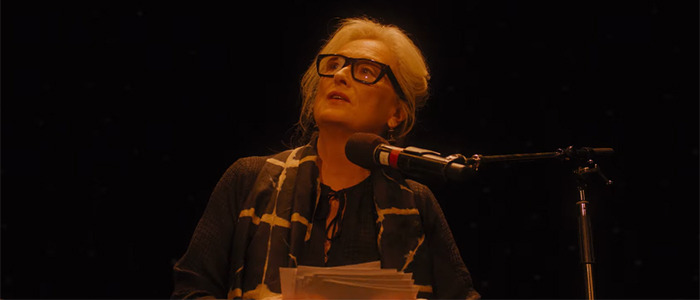15 Years Ago, 'The Devil Wears Prada' Transformed Meryl Streep Into A New Kind Of Icon
In 2003, Lauren Weisberger released her debut novel, The Devil Wears Prada, a comedy about a young woman hired to be the personal assistant of a powerful and notoriously harsh fashion magazine editor. Upon its publication The Devil Wears Prada attracted attention because Weisberger had worked for Anna Wintour, the somewhat infamous editor-in-chief of American Vogue. Of course, audiences presumed the novel to be autobiographical, something Weisberger weakly denied. Immediately, the book was a bestseller, and a film adaptation was quickly greenlit.But who would play Miranda Priestly, the beastly fashion queen who terrorized everyone around her? Who could possibly live up to the near-legendary status of a character so clearly inspired by one of the most recognizable and feared women in fashion? Well, who can play a legend but another legend?For the 2006 adaptation of The Devil Wears Prada, the filmmakers wanted only one woman to play Miranda: Meryl Streep.It seemed like a strange choice at the time given that she wasn't exactly known for this sort of film. To the world, Streep was the Oscars' most beloved darling, a woman defined by her greatness as an actress but also her seeming seriousness. While she had done comedies in the past, most notably the hilarious Death Becomes Her, general audiences didn't see Streep as the kind of star who loosened up or poked fun at herself. By the early 2000s, she'd already faced more than one round of backlash. To some, her immense talent was belied by the po-faced bleakness of the films she made, some of which verged onto the parodic.Nowadays, it's hard to imagine anyone hating or dismissing Meryl Streep as she has ascended to undisputed legend status, but it took her a while to get to the top of that mountain. Indeed, it was The Devil Wears Prada that turned Streep from a brilliant actress into a bona fide icon.
Meryl Streep, Meryl Streep, Meryl Streep
From the very beginning of her career, it was clear that Mary Louise "Meryl" Streep was destined for big things. While studying at the Yale School of Drama, she made a name for herself thanks to her impeccable range, then she made the jump to the New York stage and become instantly adored by the critics. She did seven roles in her first season, and she played everything: Shakespeare, musicals, Victorian comedies, Tennessee Williams, Chekov, and Arthur Miller. She soon made the leap to film with The Deer Hunter, which immediately landed her an Oscar nomination. It was clear that she would be a star. In 1979, the New York Times wrote, "Meryl Streep, Meryl Streep, Meryl Streep. The name may still be unfamiliar to the general public, but soon it should echo from coast to coast [...] In glasstowerea talent agencies, Hollywood studios, and offices of Broadway producers — wherever deals are made and careers launched — people in the know are asking for Streep, more Streep." And more Streep they received. That year, she starred in Kramer vs. Kramer as the wife who leaves her family only to return and engage in a bitter custody battle with her ex. Filming was highly fraught. Streep's co-star Dustin Hoffman would insult Streep and taunt her over the recent death of her fiancé, John Cazale, claiming it was his way of getting a good performance out of her. He even slapped her without warning before one scene. It never seemed to dawn on him that Streep, who famously rejects method acting, was perfectly capable of giving a good performance on her own. She famously rewrote some of her own dialogue to make the character more human and sympathetic, and the result was a staggeringly emotional performance that greatly expanded the film's original intentions. It won Meryl her first Oscar. Soon, one of the most enviable streaks of success and acclaim followed.In an industry that callously shoves actresses into limiting types, Streep was impossible to define. She played such wildly different roles in a variety of stories and received endless Oscar nominations for her work in a way that no other actor or actress seemed capable of (or, at the very least, none of them were offered such vast opportunities.) Soon, she was known as one of the best in the business, the woman who could do anything (especially accents, with her seeming ability to mimic every dialect becoming something of a calling card.) Her versatility saw her take on a range of roles and projects that was rare among even her most lauded contemporaries. Over the course of the 1980s, her star rose, but she also faced a kind of backlash.
The Backlash
Critics seemed to get oddly bored of her talent, accusing her of picking humorless roles, being too reliant on accents, and suffering under the lens of overexposure. One 1994 piece in The New York Times loudly declared, "Lighten up!" Even some of her more celebrated performances became the stuff of jokes. A Cry in the Dark, a drama centered on the story of the wrongful murder conviction of Lindy Chamberlain, faced mockery as audiences and many TV shows latched onto Streep's Australian-inflected screams of "A dingo's got my baby." Throughout the '90s, Streep tried comedies, but critics and audiences seemed unimpressed. She never stopped working – or landing Oscar nominations – but she wasn't so big a deal anymore. She became a reliable figure, but not exactly the star who once shone so bright that she was declared her generation's finest actress. That changed as the 2000s arrived. Streep landed another Oscar nomination in a much quirkier role with Spike Jonze's Adaptation, she worked with big name directors and offered fun supporting roles in comedies like Lemony Snicket's A Series of Unfortunate Events. But it took until 2006 for her to once again become the one and only Meryl Streep.
An Iron Hand in a Velvet Glove
It can be tough to choose the peaks of Streep's career, but her performance in The Devil Wears Prada is undisputedly one of her greatest performances. In the book, Miranda Priestly is cartoonish, a drawling English accent coupled with moments of scathing cruelty that ring truer as hard-nosed drag than a real person. What Streep does is bring quietness to Priestly. She's at her most intimidating when she peers over her glasses with tedium at her targets. Her voice never rises above a disdainful murmur but her intentions and one-liners are potent. It helps that the film is far more sympathetic towards Priestly than the book ever was. She's still a scary boss who enjoys driving those around her to ruin, but she's also an overworked businesswoman working to navigate a cutthroat industry while her personal life unravels.Crucially, Streep doesn't do an Anna Wintour impersonation. As with the best Streep performances, her work here is underplayed yet laden with nuance, an iron hand in a velvet glove. Streep also had a keen understanding of Priestly that the book never offered. It was thanks to her that the film kept the cerulean sweater speech, a moment that highlights Priestly's genuine passion for her work, oft maligned by fashion skeptics, as well as her utmost seriousness. But she's also super effing cool, styled to the hilt with perfect posture and a wardrobe to kill for. That coupling of performance with iconography, as well as the pure joy of seeing the woman from Sophie's Choice loosen up, made Streep utterly irresistible. For the first time in a while, she was a mainstream star.In the 15 years following The Devil Wears Prada (and the rightly deserved Oscar nomination it earned Streep), Meryl has evolved into living legend status. Not only is she still racking up awards left and right but, now in her 70s, she's a bankable box office force thanks to films like Mamma Mia!, Little Women, and Mary Poppins Returns. Comedies make up a greater portion of her filmography than decades prior, which has only further endeared audiences to her work. She has three Oscars from a record-breaking 21 nominations. There was even outcry when she didn't make the New York Times's list of the 25 Greatest Actors of the Century. Once again, Streep is loved. She's iconic. In discussing The Devil Wears Prada, Dennis Lim said that "Streep – in her own iconic, institutional way – is, yes, underrated." What he meant is that it became far too easy to take advantage of Streep's talent. She's so dang good that we almost forgot because we were used to seeing her displays of consistent cinematic excellence.
No Strings Attached
What changed? The Devil Wears Prada isn't just a great performance; it's a display of Streep having an absolute ball. For many viewers, this was the first time they'd seen her seemingly enjoying herself on-screen, especially after decades of emotionally draining roles like Sophie's Choice. This is obviously a blinkered way of viewing Streep. She's been doing comedies since her stage days and her work in a now-famous production of The Taming of the Shrew alongside Raul Julia saw her lauded as a comedic force. Of course, most people never saw that show. What we had were the bleak dramas, the crying monologues, and the surrounding hype that defined her as perpetually solemn. Once given a wide platform to show otherwise, at the right time and with the right material, Streep changed the conversation. Now, Meryl is comfortably an icon. Still working regularly, she's in a unique position: a star with the acclaim to match her new commercial force; someone whose future work excites us as much as her decades of previous performances. The Devil Wears Prada may have helped push Streep back into the spotlight with a fresh second act of professional enthusiasm, but she's never had anything to prove to anyone. It's just that, now, people are happy to embrace her, no strings attached.




